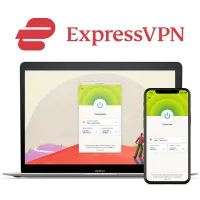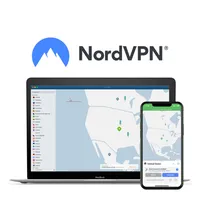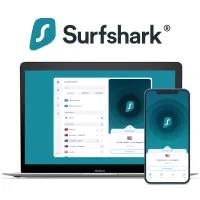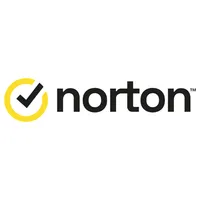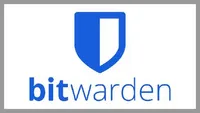The best software to protect your new computer
Here's everything you need to secure your new computer from online dangers.

Once the excitement of unboxing your new computer subsides, it’s time to figure out how to protect it. After all, now it’s just you and your PC against a world of things that are out to get it like malware, hackers, and data harvesters. A moment of vulnerability is all it takes to threaten the functionality of your computer and leave you open to scams or identity theft.
Whether you’re planning on using your PC for heavy gaming sessions, for work or to watch your favourite movies and TV shows, you’ll want to put in place protections to keep it safe. The good news is all you need is the winning combination of an antivirus, a VPN, and a password manager. Then, you can feel confident to browse the web, stream and game to your heart’s content.
There are plenty of services to choose from. Though, right now, you likely want to spend less time researching and more time finding the perfect desktop background. Don’t worry, we’re here to help. Informed by extensive testing, the experts at TechRadar have put together this up-to-date list of the best VPNs, best antiviruses, and best password managers to protect your new computer.
The best VPNs in 2026
A VPN (virtual private network) is a powerful asset in your cybersecurity toolkit. By tightly encrypting your data, it can stave off bad actors attempting to gain access to your data. As a result of the VPN cloaking/spoofing your IP address, you can also use it to access to geo-locked streaming content. It can even speed up your internet connection by helping you bypass bandwidth throttling from your internet service provider.
1. ExpressVPN - the best VPN all-round
ExpressVPN easily justifies its price tag by delivering a near-perfect mix of impressive speeds, airtight security, and expansive content-unblocking capabilities. What’s more, the experience of using this service couldn’t be any easier, thanks to ExpressVPN’s intuitively designed app. Just in case you do run into trouble, their attentive customer service team is on hand 24/7.
To further sweeten the deal, ExpressVPN bundles 1 year of unlimited cloud storage and 3 additional months of VPN coverage with their 12-month subscription.
2. NordVPN - the best speedy VPN
NordVPN majorly impressed us by delivering some of the fastest speeds of any we tested. Add to that reliable global Netflix access and in-depth customisation options and it’s easy to see why this provider ranks so highly.
What’s more, you can hit two birds with one stone by choosing Nord, as their VPN service comes with antivirus included as standard.
3. Surfshark - the best budget VPN
After splashing the cash on a new computer, you might be looking for a VPN that’s kind on your sore wallet. Luckily, Surfshark provides a budget-friendly VPN service that doesn’t compromise on quality. What’s more, they’re one of the few VPN providers that can protect an unlimited number of devices simultaneously.
If Surfshark’s don’t have you convinced, you can take advantage of their 30-day money back guarantee.
How to pick a VPN to secure your computer
There are heaps of VPN providers to choose from. While this is great news in most regards, it does mean that it’s easy to get bogged down when deciding which is the best VPN for you. To save yourself a headache, use the factors listed below to guide your choice.
Cost: While you should always try to maximise safety and functionality, some pricier providers offer a basic tier of service that is more affordable. Beyond that, make sure to keep an eye out for great VPN deals, especially around Black Friday and Cyber Monday.
Features: When choosing a VPN, it’s helpful to take a look into its roster of features as well as the reliability of those features. For example, a kill switch will cut out your device’s internet connection in cases when your VPN disconnects, preventing you from browsing unprotected.
Servers: Naturally, a VPN having a high number of servers is an attractive selling point. It’s also important to consider how effectively distributed these servers are. The more countries your provider has servers in, the more choice you have when it comes to streaming or shopping in global marketplaces.
How we test VPNs
To achieve the highest degree of ethicality and accuracy, we’re as thorough as possible when it comes to our testing methodology.
What does our VPN test process entail? First, we register for our subscriptions anonymously to help replicate the kind of experience you’d have at home. As long as providers don’t know they’re being tested, we can rest assured that they’re not just on their best behaviour for us.
Once we have access to the service, these are some of the core aspects we focus on:
Consistency across operating systems: After installing and using each provider’s apps on Windows, Mac, Linux, iOS, and Android, we assess each version’s reliability, ease of use, and availability of features.
Security: While claims of reliable tunnelling protocols, kill switches, and leak protection certainly sound appealing, it’s vital to see them in action. To achieve this, we rigorously stress-test each VPN. From faux cyberattacks to forcibly dropping our connection — we throw every challenge we can at our VPN to see how protection holds up.
Speed: To achieve the most accurate results, we perform our speed tests multiple times during a 24-hour period and measure with an array of reliable tools.
Unblocking capabilities: By trying to access geo-locked content on streaming sites like Netflix, Disney Plus, Amazon Prime Video, or region-locked services like BBC iPlayer and HBO Max, we properly verify each provider’s content unblocking capabilities.
Privacy: We deep dive into each provider’s privacy policy to see how customer data is handled, and are careful to make sure we don’t miss anything shady in the small print. We also investigate the outcome of any third-party audits the company has undergone.
Using a VPN FAQs
Is using a VPN legal?
Across most of the globe, VPNs are legal. That said, there are a few geographical exceptions. Some countries including China, Russia, Turkey, Iraq, and North Korea all restrict VPN use to varying degrees. So, if you plan to travel to any of these regions anytime soon, make sure to familiarise yourself with local laws on using a VPN.
Is it safe to use a VPN?
Using a VPN is a valuable step in maintaining your safety while connected to the internet. A VPN from a reputable provider like ExpressVPN, NordVPN, or Surfshark will have a significant positive impact on your level of online privacy and protection from cybercrime.
To avoid any possibility of your data being misappropriated by your VPN provider, choosing one with a no-logs policy is vital. For peace of mind, you’ll also want to want to make sure that the provider has demonstrably adhered to this policy during their external audits. RAM-only servers are a great sign too, as this ensures that any of your data that is collected can only be stored on their servers temporarily.
How difficult is it to set up a VPN?
The VPN services on our list all excel in providing a super beginner-friendly experience by featuring informative FAQs and knowledge bases to help you fill in any gaps in your understanding. As a result, setting up your VPN is exceedingly hassle-free. If you happen to come across any problems, you can quickly get back on the right track, as each one of our chosen providers offers 24/7 customer support via live chat.
The best antivirus in 2026
Antiviruses cast a watchful eye over any potential cybersecurity threat you face. Informed by a database of virus signatures known as ‘definitions’, antiviruses spring into action upon identifying a threat. Once the threat is confirmed, your antivirus will work to stop it in its tracks.
1. Bitdefender - best antivirus all-round
Bitdefender delivers an excellent service that is positively jam-packed with features. Its quality performance is especially impressive when you factor in its affordable price. Alongside its reliable and easy-to-use antivirus, your Bitdefender subscription also comes with a VPN, parental controls, and a range of safe banking tools.
Get started with a 30-day trial of Bitdefender Total Security to see it in action.
2. Norton - best antivirus for identity protection
In addition to the reassurance offered by Norton’s dependable malware protection, you can feel totally confident that your personal information is safe due to LifeLock, their identity theft monitoring tool which proactively scans the web for any signs of your compromised data.
If still you’re on the fence about Norton, you have plenty of time to make up your mind thanks to their generous 60-day money-back guarantee.
3. Avast One - best antivirus for gamers
Avast One supplies top-tier malware protection at a price that won’t break the bank. Alongside this, you can get extra perks like a VPN, a password manager, webcam monitoring, and anti-phishing tools. This service is perfect for gamers as it engages a specialised gaming mode automatically when you boot up any of your favourite titles.
While Avast One’s premium suite undoubtedly justifies its price tag, you can try out a basic version for free.
How to pick an antivirus to secure your laptop
While our choices for the best antivirus help to narrow down the massive pool of providers, the final choice is still yours to make. Wondering what you should be looking out for when making that choice? Ultimately, the antivirus you subscribe to should be dictated by your personal security needs, use cases, and budget.
Security: All good antiviruses protect from malware but some go above and beyond to offer features like checking the Dark Web for your stolen data or delivering in-browser defence against phishing and other scams.
If you’re particularly privacy-conscious, it’s worth selecting a service with a more powerful line of defence against data theft. As well as this, if you’re well-accustomed to using an antivirus, you might want a service that allows for plenty of under-the-hood fine-tuning.
Use cases: Have a lot of devices? Want to cover your family’s devices too? If so, you’ll need an antivirus that allows for a high number of simultaneous connections.
Budget: If your budget is tight, it’s helpful to seek out antiviruses that come with other services like a VPN for a single subscription fee.
If you’re still feeling stuck, we have an entire article that can take you through the process of choosing the best antivirus in more depth.
How we test antivirus software
The most crucial feature of an antivirus is being able to consistently recognise and neutralise malicious files. To verify this, we create a safe testing environment that simulates actual cyber threats. First, we download the EICAR anti-malware test file, which functions similarly to actual malware without harming your machine. Once we confirm an antivirus can correctly identify the threat of the EICAR file, we trial its ability to react to bespoke faux viruses developed by our team.
Outside of quantifying the performance of each antivirus, we also factor in the quality of the user experience. Apps that are well-designed and easy to navigate get major points in this area, as do helpful FAQ sections and jargon-busting glossaries.
The final port of call is investigating the standard of customer support. Where available, we try out their live chat and raise support tickets via email. Regardless of the channel of communication, we’re looking out for customer support that is prompt and helpful.
Using antivirus FAQs
What’s the best antivirus?
According to our testing, Bitdefender offers the best antivirus service. As well as proving incredibly effective at defending against malware and ransomware, Bitdefender includes an impressive array of cybersecurity features like a VPN, banking protection, and parental controls. It’s also perfectly optimised for beginners from installation to set-up.
How does an antivirus protect my computer?
Antiviruses work to protect your computer by detecting viruses in real time and quarantining them before they enact any harmful processes. Some antiviruses provide additional features which can help you recover from the effects of viruses like identity theft monitoring or recovery for files encrypted by ransomware.
Can I use a free antivirus?
When you purchase a new computer, it may come bundled with a few months of an antivirus subscription. Once that freebie expires, you might feel reluctant to fork up cash for a service you’ve already been enjoying for free. Thankfully, several antivirus providers have stripped-back versions of their services available at no cost. In short, a free antivirus may be sufficient, depending on your cybersecurity needs. To help you decide, check out our article on whether free antivirus is enough to protect you.
The best password manager in 2026
Despite the convenience, using the same password for all of your accounts is a choice that can leave you seriously vulnerable to cybercrime. It's a far better choice to use a password manager, which offers the perfect mix of saving you time and keeping you safe. With just one master password, you can have your password manager autofill your login details across multiple sites and devices.
1. NordPass - the best password manager all-round
NordPass knocks it out of the park with password manager plans that suit beginners, power users, families, and businesses.
Whether you opt for their solid free tier or their top-end premium plan, you can be sure you're getting a reliable service that's a breeze to use.
2. Dashlane - the best high-security password manager
Dashlane is a feature-packed password manager with a particular reputation for serving businesses and privacy-conscious individuals.
While it's on the pricier side, top-tier security and the inclusion of a VPN make this service worthwhile.
3. Bitwarden - the best free password manager
Bitwarden delivers a surprisingly capable service with its free tier.
Provided you don't need any advanced features, Bitwarden is the ultimate way to enjoy the safety and usability of a top-tier password manager without the paywall.
How to pick a password manager to secure your computer
Choosing the right password manager for you involves choosing a service that is reputable, covers a sufficient number of devices, and fits within your budget.
If you’d prefer to use a password manager that doesn't need a master password, opt for a passwordless password manager that allows you to access your vault using biometric credentials like face ID or your fingerprint.
Ideally, you won’t need to change to a different password manager once you’ve settled on one. However, what you need from your password manager could change over time, so choosing one that allows you to quickly and easily export your vault is a great bonus for your future self.
How we test password managers
We spend extensive time testing out 30 of the best password managers on multiple devices, to ensure provide a consistent experience across browsers and platforms. As well as that, we make sure that the password manager syncs reliably across devices so we can guarantee constant seamless access to your login credentials.
To point any security concerns to bed, we research each password manager’s encryption methods and assess which providers run according to a truly zero-knowledge architecture. We also performed numerous trials on each service’s multi-factor authentication security measures.
Finally, we reach out to customer support, taking note of how quickly and effectively they can address any concerns or queries we have about the service. In combination, all of these tests help us to form our final verdict of the best password manager.
Using a password manager FAQs
Can I use a free password manager?
You’ve likely come across free first-party password managers while using Chrome or Apple’s Keychain. While these get the job done, they don’t allow you to sync outside of their designated ecosystems. Our suggestion would be to use a third-party password manager.
Thankfully, there are reputable password managers which have a free tier available. It’s also worth mentioning that some of our picks for the best VPN come with a password manager included.
How does a password manager work?
A password manager encrypts all your passwords in a ‘vault’ which can be accessed using a master password and/or other forms of verification like 2FA or biometric data.
Are my passwords safe with a password manager?
Your cyber safety is your password manager’s business so the provider has to commit to taking the utmost care in encrypting your passwords. That said, you can feel at your safest by choosing a password manager that is built on zero-knowledge architecture.
This way, your password data is entirely thoroughly encrypted before it reaches your providers’ servers. So, if these servers are breached, your data remains safe.
Do password managers work with apps?
The majority of the top password managers have iOS and Android apps for you to download on your smart device. Additionally, many also have a browser extension available for use on browsers like Safari or Google Chrome.
We test and review VPN services in the context of legal recreational uses. For example: 1. Accessing a service from another country (subject to the terms and conditions of that service). 2. Protecting your online security and strengthening your online privacy when abroad. We do not support or condone the illegal or malicious use of VPN services. Consuming pirated content that is paid-for is neither endorsed nor approved by Future Publishing.
Sign up for breaking news, reviews, opinion, top tech deals, and more.

Olivia joined Tom's Guide in October 2023 as part of the core Future Tech Software team, and is the Commissioning Editor at Tom's Guide. With a background in cybersecurity, Olivia is interested in how VPNs protect users' privacy, and how they improve online safety. She also regularly uses VPNs to make sure they deliver what they promise, and specializes in testing VPNs with streaming sites.
